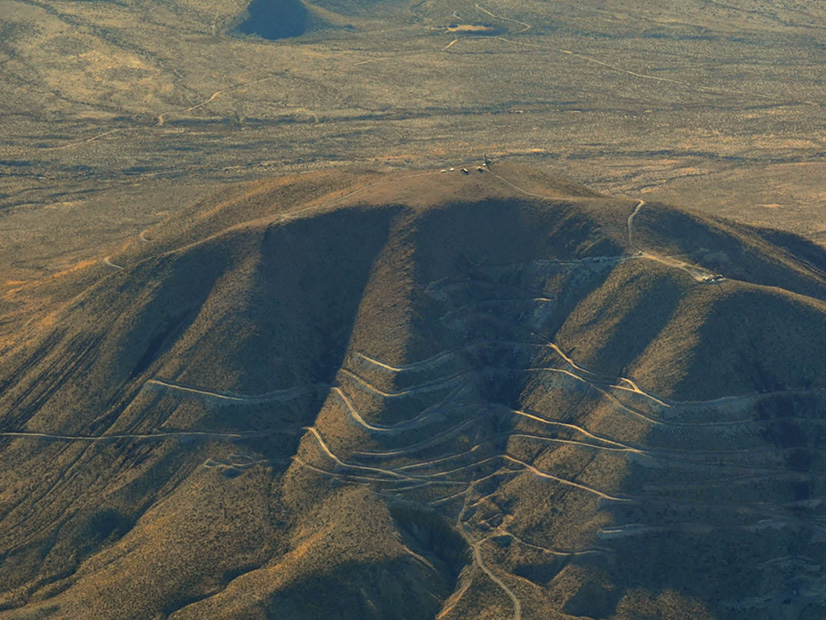
The Biden administration’s emphasis on decarbonizing the U.S. economy may be more vulnerable to foreign influence than oil ever was.
That the administration is aware of this vulnerability is apparent in the U.S. Geological Survey’s proposed expansion of its list of minerals critical to U.S. supply chains, now expanded to 50 from the 35 in the previous administration.
It also is in favor of domestic mining these minerals, as detailed in the Infrastructure Investment and Jobs Act approved in November that called for the departments of the Interior and Agriculture to work on streamlining permitting for the mining of rare-earth minerals on federal land. (See Energy Groups Quick to Praise Infrastructure Bill Passage.)
The importance of minerals and the vulnerability created by not sourcing them at home or through companies located in friendly nations could become an issue slowing the effort to move away from carbon-intensive fuels.
But developing policies to promote domestic mining and mineral refining as well as global sourcing while not alienating competing interests or making decarbonization look impossible is a balancing act.
D.C.-based think tank OurEnergyPolicy presented a webinar on the issue Wednesday that focused on the underlying issues, including the politics, and the development of policies to make the nation less vulnerable. The webinar was part of the group’s Energy Leaders Webinar Series and will soon be publicly available online.
 Sharon Burke, president of Ecospherics | OurEnergyPolicy
Sharon Burke, president of Ecospherics | OurEnergyPolicy
Sharon Burke, president of energy and environmental research group Ecospherics, moderated the discussion. She noted that the nation is more than 50% import-reliant on 31 of the 50 rare-earth minerals and 100% import-reliant on about a dozen of them.
Melanie Kenderdine, principal at the Energy Futures Initiative, said the politics surrounding the issue make it difficult for policymakers.
“It’s a little bit of an inconvenient truth,” she said. “There is a suggestion that ‘renewables’ that are free and everywhere are not necessarily as secure as we might think.”
Part of the problem, she suggested, is that the public and many policymakers “tend to think of energy security as fuel.”
“These are not fuels,” she said of rare-earth minerals. “They are capital costs. And so the lifespan of these technologies … that is what defines the draw on the metals and minerals that we are talking about here today. The lifespan of these technologies is defining the extent of the energy security problem we’re talking about here.”
 Melanie Kenderdine, principal, Energy Futures Initiative | OurEnergyPolicy
Melanie Kenderdine, principal, Energy Futures Initiative | OurEnergyPolicy
Kenderdine suggested that the U.S. Department of Energy and Energy Information Administration begin keeping detailed statistics on strategic minerals and metals as they already do with natural gas, oil and refined products.
Morgan Bazilian, director of the Payne Institute at the Colorado School of Mines, agreed, but added that keeping track of metals and minerals “is not as simple in some ways as understanding the global oil market or the increasingly global natural gas market.”
“What we have in critical minerals is at least 35 and probably closer to 50, as you alluded to, and maybe even a little bit more of deeply fragmented, very small, poor price transparency and poor governance markets,” he said. “So it is much more difficult to group these things together because they are individually very different and so all of that combined, makes a very different problem.”
Asked to compare the Biden administration’s approach to minerals with that of the Trump administration, Aaron Thiele, legislative assistant for energy and natural resources to U.S. Sen. Lisa Murkowski (R-Alaska), said he thought that overall “there is a good level of continuity and urgency.”
 Aaron Thiele, legislative assistant to U.S. Senator Lisa Murkowski (R-Alaska) | OurEnergyPolicy
Aaron Thiele, legislative assistant to U.S. Senator Lisa Murkowski (R-Alaska) | OurEnergyPolicy
“I think the administration is kind of grappling with some of their constituencies, and the critical minerals debate always comes down to whether or not it’s going to increase domestic mining and that has its sticky points in politics,” he said.
Thiele said moving from fossil-based technologies to renewables involves tradeoffs and new resource requirements.
“The question is, if we are taking this rapid transition to renewable energy resources, to electric vehicles, where are we going to be in 10 years if we don’t have either domestic [mineral] or partner agreements with nations to lessen that impact? The demand for these minerals is going to be there. The question is, where are we going to source it? Are we going to be able to recycle it, or are we going to substitute it? There is going to need to be a supply side,” he said.
Kenderdine said developing recycling technologies will be important because alternative technologies are not ready for commercialization.
“Recycling and reuse becomes very important,” she said. “I would prioritize that first. And looking at alternatives for these metals and minerals. That’s going to take time and infrastructure.
“Domestic mining, I think, becomes very important,” she added. “But there are a lot of issues with that as well. So I would put recycling and reuse very high up on the agenda, and we should be requiring it.”
Burke asked Bazilian whether the priorities outlined by Kenderdine and Thiele are the right strategy.
 Morgan Bazilian, director of the Payne Institute, Colorado School of Mines | OurEnergyPolicy
Morgan Bazilian, director of the Payne Institute, Colorado School of Mines | OurEnergyPolicy
“I think there has to be a bigger conversation about the balance between the kinds of things Aaron talked about, which is the domestic industry,” Bazilian said. “This is a big issue for developing economies; a lot of them take a lot of their GDP from extractive industries like mining. And focusing solely on our needs or the needs of one country, in general, is bad policy, right? It doesn’t work. We’re in a deeply interconnected world.
“I understand the politics of it, but it’s not the way to do something well. And so, you know, we have to really play a role in this international debate, and support some of these other countries and try to make a thoughtful balance between the domestic and the international,” Bazilian said.
“I recognize, however, that that sounds naive,” he quickly added. “In other words, that’s not how domestic politics go. The priority is clearly and always going to be on the domestic role for this and the jobs and those things at the state level. … [But] if you don’t look at this from a larger perspective, you’re going to make policies that are either inefficient or just bad.”


